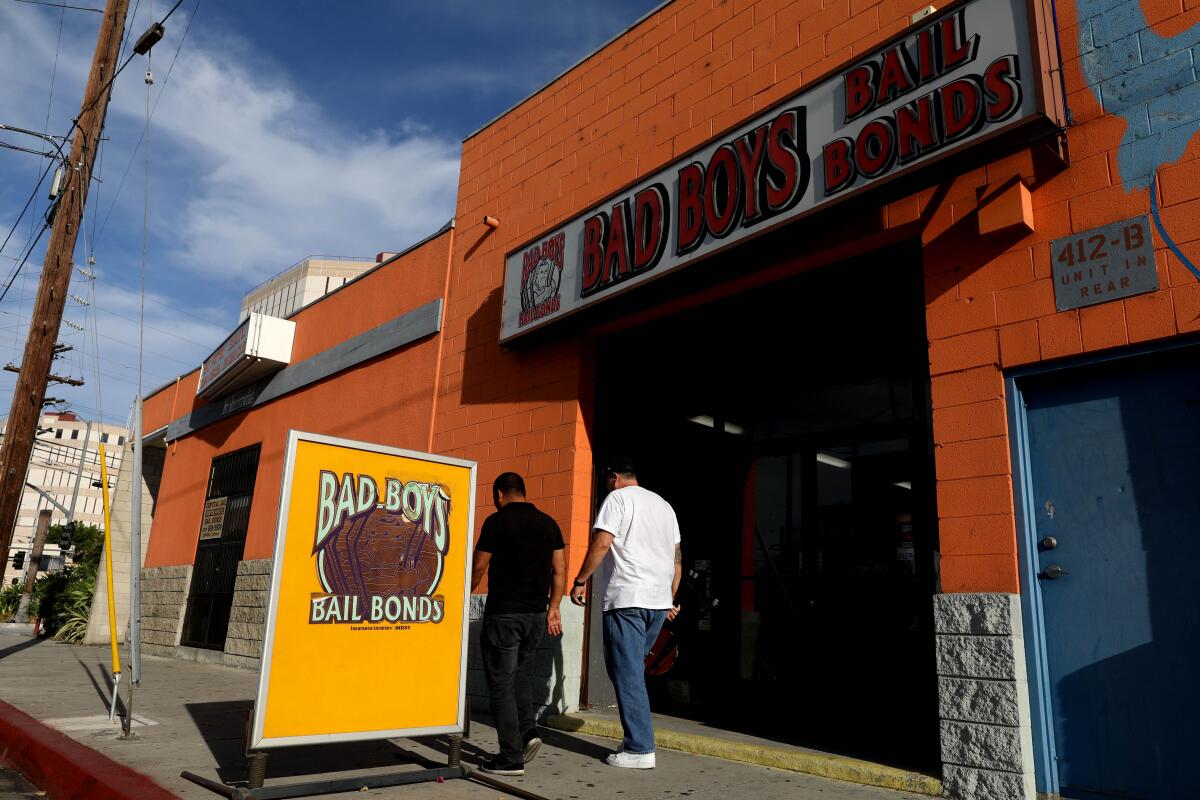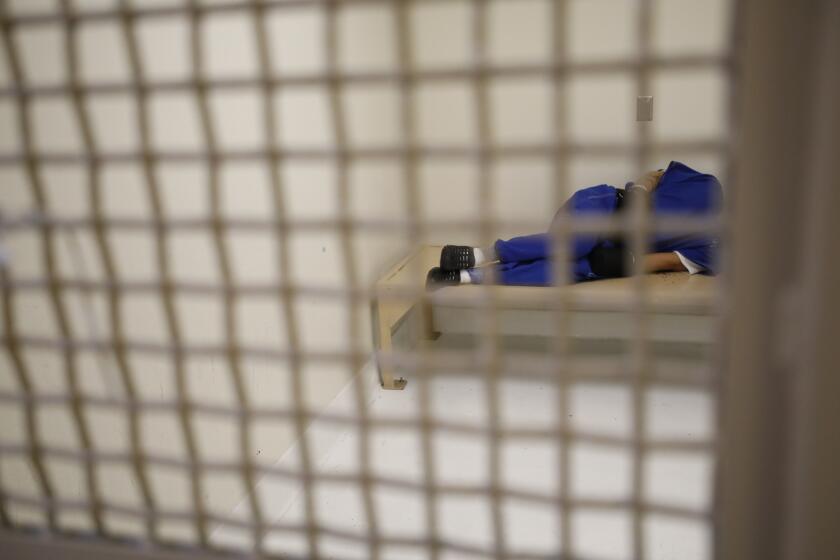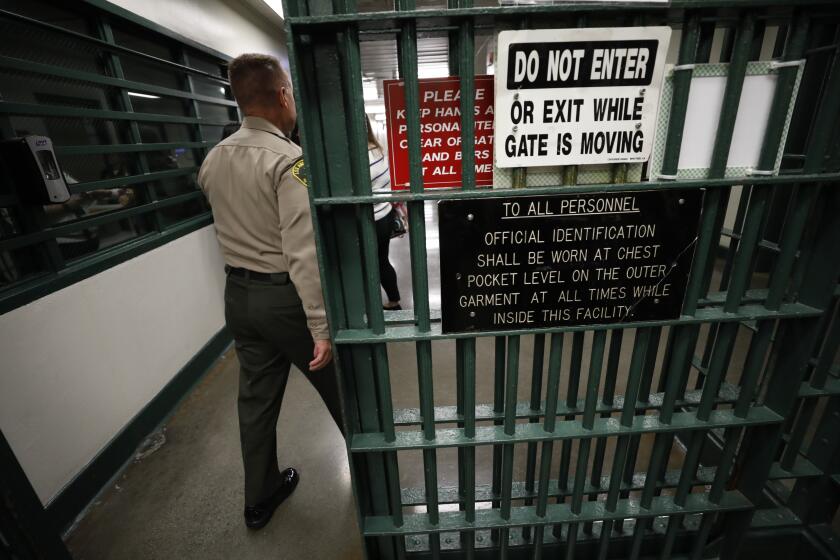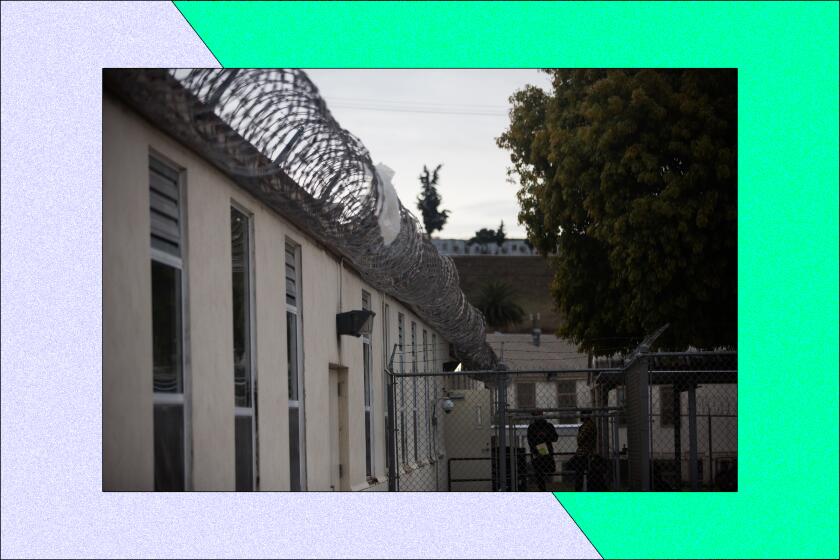Goodbye to cash bail. L.A. is moving to a better approach to pretrial justice

- Share via
In one week, the system for handling most people after they’re arrested in Los Angeles County changes, finally giving L.A. a safer and more just approach to the pretrial process.
The current regimen — pay money bail at the police station without a hearing or go to jail — is to be replaced for most suspects.
The word “bail” and related terms can mean many different things. The resulting confusion helps bail reform opponents in their fight to keep the unjust status quo.
Police will issue citations on the street or at the station to suspects accused of lower-level crimes, then release them with instructions to appear in court for their first hearing several days later. Those accused of more serious crimes will be held at the station while magistrates — working remotely, without seeing or hearing from the defendants or prosecutors — review their records and decide whether to send them to jail to wait for their hearings, or release them with any of a variety of conditions that don’t include money bail.
This new set of procedures was announced by the Los Angeles Superior Court on July 18 and has been modified over the following weeks. It comes at a time of high-profile retail thefts and brazen robberies in L.A., which police, prosecutors, some elected officials and pundits wrongly blame on existing so-called zero-bail policies. Their response is to demand higher bail and more jail time for suspects. The court’s new system — called Pre-Arraignment Release Protocol, or PARP — moves in the other direction and is bound to be controversial.
The Los Angeles Superior Court is wiping out money bail for many crimes. Evidence shows this makes the public safer, but people who should know better are likely to offer fact-free commentary about the change.
There remain many unanswered questions about the details of the program (for example, will some magistrates be tougher than others? How will that data be gathered and assessed?) and there will likely be continuing adjustments such as determining which crimes qualify for cite-and-release (on the street) instead of book-and-release (at the station) or magistrate review. But at its core, the new protocol is a strong step toward justice and improved public safety, and away from ignorance and fear. L.A. residents should embrace it.
The L.A. County Superior Court is scaling back cash bail, but it was outclassed by the Illinois Supreme Court, which upheld legislation halting it altogether.
The existing money bail system creates a two-tiered system of justice that locks up people with little money while selling liberty to those who can afford it. It betrays fundamental American values such as equal protection under the law and presumption of innocence before trial. It is widely misused to keep accused people in jail, completely mangling its intended purpose, which is to help them get out. It cedes basic decisions over the fate of individual Americans to a private, for-profit bail bond industry that is prohibited in every other nation on the planet except the Philippines, but that is enriched in the U.S. by nonrefundable fees extracted from the guilty and innocent alike.
In California, the bail-or-jail system is divided into two discrete decision-making processes. The part that changes next week is the first one, known as pre-arraignment because it affects people from arrest to their first appearance before a judge several days later.
L.A. officials knew the bail schedules they used to lock people up before trial were unjust, but they didn’t act. Now a ruling will force them to do so.
Under the current system, the decision about bail or jail takes place while suspects are in police custody and before they have a defense lawyer or can present their case to a judge. The suspect either pays what is asked or goes to jail for, in theory, up to three days — but often as much as a week. Not even the prosecutor generally knows about the case at this stage. It’s solely a matter between police, the bond agent and the jailer.
A lawsuit challenging how L.A. County handles the pre-arraignment phase was filed in November, and the case has revealed often shocking aspects of the system. For example, plaintiff Phillip Urquidi lived in a pickup truck with his girlfriend when he was arrested by a Los Angeles police officer on suspicion of vandalism. He had no money for bail and was sent to jail, where he learned that the district attorney declined to prosecute. Yet he remained in jail for days, without access to his medication, losing work and unable to contact his girlfriend, in part because L.A.’s criminal justice bureaucracy is hampered by poor communication and stunningly outdated data systems.
Like the American dream, the California dream of fresh starts and fair play is undermined by rules that protect privilege and punish poverty.
Testimony in the lawsuit has produced overwhelming evidence through academic studies of real-world pretrial systems that the money bail system not only fails in its purported quest to protect public safety but actually degrades it and results in higher crime.
Over the next week, in advance of the new pre-arraignment protocol, the Times editorial page will examine these and other aspects of L.A. bail reform, including the data on crime, the pushback by police and others who demand that punishment begin before trial, the confusion over basic terms (the difference between bail and bond, for example), and the need for more action and backbone among elected leaders on criminal justice issues.
There will be much discussion about the new pre-arraignment protocol, including a Board of Supervisors hearing Tuesday. Expressions of concern are fair game with such a monumental program, but it’s important to stick to the facts. There are a lot of moving parts, but one way or another, change — good change — is at hand.
More to Read
A cure for the common opinion
Get thought-provoking perspectives with our weekly newsletter.
You may occasionally receive promotional content from the Los Angeles Times.














